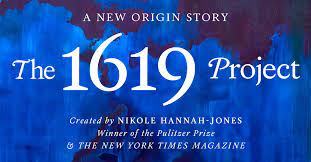“If this country was founded on liberty, then explain slavery!”
Yesterday I had the opportunity to listen to Nikole Hannah-Jones, who won the Pulitzer Prize for her best-selling book “The 1619 Project,” which details the abhorrent history of slavery in America. Since the book was first published in New York Times Magazine in 2019, it has opened the eyes to many of the horrors of the enslaved, and how its impact is still being felt today. Hannah-Jones visited the McLean Community Center’s Alden Theatre on Sunday, and she spent the time discussing how she created the concept since her days as a student in Waterloo, Iowa.
In a room filled to capacity, we were treated to a clear picture of a country that to this day struggles to admonish its racist past. Hannah-Jones introduced the harsh realities of slavery, and it was not coincidental she was speaking in Virginia. The Commonwealth was where the “original” settlers arrived, and while schoolbooks will teach that the pilgrimage was one of looking for new opportunities, there’s a much darker truth. It’s a truth that current administrations, from Virginia to Florida, want to keep hidden.
Growing up, the only thing we heard about the Revolutionary War was the Boston Tea Party, no taxation without representation, Paul Revere, and George Washington crossing the Delaware. What we didn’t hear was how slavery had a much bigger impact on the conflict than realized. The settlers wanted to purchase indigenous lands, yet King George III of England refused. This war was not simply looking to establish freedom from a monarchy, it was about developing new settlements and creating a government who could expand trade and manufacturing.
At the heart of slavery was economic growth. Yet it is something that is not taught, and the discussion that Hannah-Jones had yesterday was that even today, we are paying the price. Life expectancy rates have fallen, and the wealth gap has widened. Yes, there are proposed bills such as HB40 to bring reparations to descendants of enslaved persons, or the more recently passed HB 1419, yet the mental scars still remain. One of the points of the book was to display the hypocrisy of a country that claims to be founded on the principles of liberty, yet was willing to transport thousands of people from Africa or the West Indies for economic purposes.
Hannah-Jones has been the subject of much criticism since the book launched. She told FFXnow it has created the uncomfortable conversations that need to happen.
“Virginia in many ways is ground zero for everything else we see in America,” Hannah-Jones said to FFXnow.
While there are proposed bills on the table to address the pains of the past, for Black people, there are still several battles to be fought. For those who are in their 40’s and 50’s, it is the first generation to be fully granted citizenship rights. As Hannah-Jones said to the audience, she had a debt to pay to the ancestors who were brutalized by their oppressors.
Towards the end, she was asked what the single most important point in the lecture. “This past is shaping our society whether we want to admit it or not,” said Hannah-Jones, “so we can either confront it, or we can keep repeating the same patterns. We do have the power to do so.”
There are shameful things that need to be confronted, in order to bring healing. It comes from an acknowledgment, and a collective shame that as a nation, we need to recognize and resolve.



